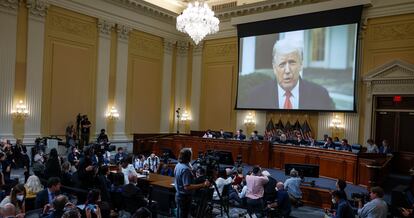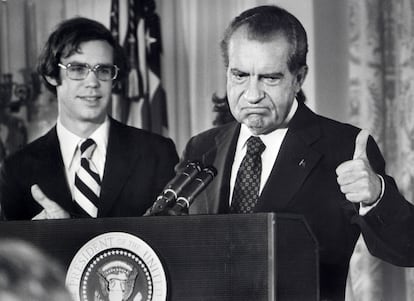January 6 committee: What to expect next from the hearings
The panel will broadcast new testimony from Pat A. Cipollone, but with surveys showing that less than half the population are tuning in to the sessions, there are doubts about whether the findings will lead to charges against Donald Trump


On the morning of January 6, 2021, the White House’s main legal adviser at the time, Pat A. Cipollone, told Cassidy Hutchinson, then a White House aide: “Please make sure we don’t go up to the Capitol, Cassidy. Keep in touch with me. We’re going to get charged with every crime imaginable if we make that movement happen.” That’s according to Hutchinson, a former aide to then-president Donald Trump’s chief of staff Mark Meadows who provided damning testimony last week at the House select committee investigating the insurrection at the US Capitol on January 6, 2021.
At the end of her testimony, Bennie Thompson, the chairman of the committee, said that her courage would inspire other former Trump allies to speak out about what happened. “If you’ve heard this testimony today [...] and you discovered some courage you had hidden away somewhere, our doors remain open,” Thompson said. On Friday, Cipollone, who had been reluctant to speak until now, spent seven hours giving closed-door testimony before the committee.
Cipollone’s answers were “honest” and “did not contradict the testimony of other witnesses,” Congresswoman Zoe Lofgren told CNN that day. What he said in the seven-hour interview is likely to be among the highlights of the next two upcoming committee hearings. The first will take place on Tuesday and focus on the links between Trump’s false claims of voter fraud and far-right groups such as the Proud Boys and Oath Keepers. The members of these groups met in Washington on January 6 for the Trump rally and led the siege on the US Capitol. The attack – which the committee wants to prove was planned – sought to prevent the certification of Joe Biden’s election victory, a democratic process that had never been interrupted before.
In a surprising plot twist, former Trump advisor Steve Bannon announced on Saturday that he is willing to speak with the Jan. 6 committee. The alt-right leader confirmed, via a letter from his lawyer obtained by CNN, that he wants to testify, ideally at a public hearing. The committee, however, has not yet decided whether to accept his testimony.
What’s more, Oath Keepers frontman Stewart Rhodes announced Friday through his attorney that he is also willing to testify at the committee, provided he is allowed to do so live and in person. Rhodes is currently in prison while awaiting trial on seditious conspiracy charges for his role in the siege of the Capitol that could see him locked away for 20 years. The offer was made on the same day that it was revealed that one of Rhodes’ co-conspirators went to Washington with explosives and a “death list” with the name of a Georgia election official, whom Trump had singled out.
Ahead of the hearing on Thursday, the committee – which is made up of seven Democrats and two Republicans – indicated that it would focus on the 187 minutes it took for Trump to tell protesters to go home. In her testimony that day, Hutchinson revealed that the Republican president knew that many of the protesters were armed, but still encouraged them to go to the Capitol to convince his vice-president, Mike Pence, not to certify the election results. According to Hutchinson, Trump even thought that the vice-president “deserved” the demonstrators’ chants of “hang Mike Pence.” (Hence Cipollone’s concern about being charged with “every crime imaginable.”)
It is not yet clear if these two hearings will be the last: the conclusions have been announced for August or September. Like the rest of the hearings, they will be broadcast in prime time in a format that mixes live witnesses (carefully chosen among Republican sympathizers for the sake of impartiality) with videos of statements gleaned from hours and hours of recording.
After the inaugural hearing, the sessions have focused on the chaotic election night of November 2020, the harassment faced by Pence, the pressure and threats made against election officials to overturn the results and the White House’s attempts to manipulate the Department of Justice.
The goal of the hearings is to share the results of months of research in an easy-to-digest TV format. But while Washington’s media and political ecosystem has been closely following the sessions, it appears that the American public is not as interested as one might expect. According to a survey by the Brookings Institution, “about six in 10 Americans say that they are closely following ‘news’ about the January 6 committee, but only one-third are closely following the committee hearings, and even fewer are watching them, even in part.”
But the committee would be happy if just one specific person took note of its findings: Attorney General Merrick Garland, in whose hand it is to charge Trump. It will not be easy call. Such a decision would have far-reaching legal and political consequences. It is not even clear whether Garland would legally be able to go after Trump – targeting Biden’s main political adversary could be seen as a conflict of interest. Impeaching Trump could also destroy the precarious balance of a deeply divided country in the midst of cultural and media wars. It could also establish a dangerous precedent, allowing an incumbent government to go after its predecessor. And then there is the fact that the evidence so far presented may not be enough to find Trump guilty at trial.

The hearings of the January 6 committee have been constantly compared to the Watergate scandal, which ended the presidency of Richard Nixon in 1972. But while the hearings from that investigation kept viewers glued to the television, today’s more polarized society is less inclined to trust the House select committee, which 60% consider to be partisan, according to an ABC/Ypsos poll. In other words, Nixon resigned when he lost the support of his supporters, but Trump supporters do not appear to have been swayed by the findings from the investigation into the siege. What’s more, the average American, gripped by inflation and runaway gas prices, has more pressing concerns.
Threats of violence over politics has increased heavily in the last few years. But the darkness has reached new lows. My new interns made this compilation of recent calls they’ve received while serving in my DC office.
— Adam Kinzinger (@RepKinzinger) July 5, 2022
WARNING: this video contains foul & graphic language. pic.twitter.com/yQJvvAHBVV
To continue with the Watergate parallel, the Jan. 6 committee still hasn’t found its “smoking gun,” but Cipollone, the man who was always there in the weeks between the election and the attack on Capitol Hill, could be the trump card they are looking for. While the contents of his testimony is not yet known, he is likely to face consequences for appearing before the committee. Just as Nixon tried to pressure witnesses, Trump aides and supporters have been threatening Republicans who have spoken to the January 6 committee. Before testifying, Hutchinson revealed that she was threatened in a message that seemed more appropriate of the mafia than the political allies of a former president. Last week, Adam Kinzinger, who is one of two Republican representatives on the committee, alongside Liz Cheney, shared a recording on Twitter of the kinds of messages he receives on the answering machine: threats of violence from callers who say they know “where he lives.”
Tu suscripción se está usando en otro dispositivo
¿Quieres añadir otro usuario a tu suscripción?
Si continúas leyendo en este dispositivo, no se podrá leer en el otro.
FlechaTu suscripción se está usando en otro dispositivo y solo puedes acceder a EL PAÍS desde un dispositivo a la vez.
Si quieres compartir tu cuenta, cambia tu suscripción a la modalidad Premium, así podrás añadir otro usuario. Cada uno accederá con su propia cuenta de email, lo que os permitirá personalizar vuestra experiencia en EL PAÍS.
¿Tienes una suscripción de empresa? Accede aquí para contratar más cuentas.
En el caso de no saber quién está usando tu cuenta, te recomendamos cambiar tu contraseña aquí.
Si decides continuar compartiendo tu cuenta, este mensaje se mostrará en tu dispositivo y en el de la otra persona que está usando tu cuenta de forma indefinida, afectando a tu experiencia de lectura. Puedes consultar aquí los términos y condiciones de la suscripción digital.








































